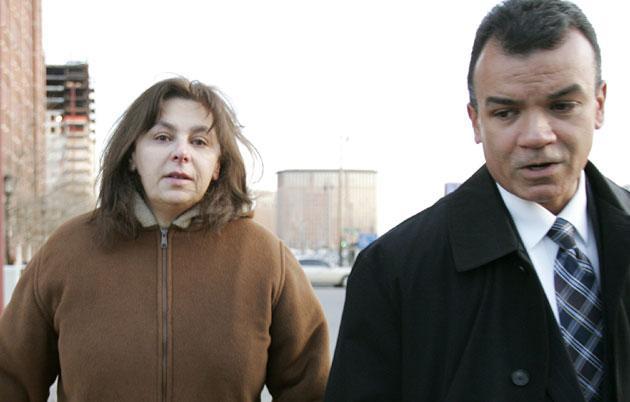Advertisement
Calls For Leniency For Sympathetic Customs Official
Resume
At the trial of Lorraine Henderson, the federal judge suggested that had the defendant been a housewife in Weston, she would never have been brought to trial for knowingly encouraging an illegal alien — her cleaning woman — to stay in the country.
Then again, had Henderson been a housewife in Weston, she probably would have hired that cleaning woman more often than twice a month to clean her condo for a a couple of hours. As it was, Fabiana Bitencourt, of Brazil, was no more than a casual hire, if also a disastrous one.
Disastrous because Henderson was the New England Port Director for U.S. Customs and Border Protection (CBP). It was her job to keep illegal aliens out of the Port of Boston.
As a federal prosecutor pointedly commented after Henderson's arrest, "She was supposed to be deporting illegal aliens, not hiring them."
Now, after her conviction and as she is about to be sentenced for a crime that carries a maximum of five years in prison, Henderson's many friends and fellow employees are asking for leniency, saying that prison time for Henderson is simply unwarranted.
"I think it's a disgrace. It should never have gone this far," said Jeanne Dugan, Henderson's former supervisor at CBP and a career federal employee. "She worked so hard for 30 years and now everything is taken away from her for no reason at all."
Dugan is one of 74 people who have written to the judge on Henderson's behalf. They describe her as hardworking, selfless and willing to step in wherever the organization needed her.
William Heffelfinger, longtime deputy assistant commissioner of CBP, said Henderson is a caring colleague who commanded the loyalty of subordinates.
Heffelfinger said while he did not condone Henderson's serious mistake, she had contributed years of outstanding service.
"She was competent and well-regarded professionally and personally," Heffelfinger said.
Over her career, Henderson had risen up the ranks from GS-2 to GS-15, the highest rank of civil service. She started at the Department of Homeland Security — working for CBP — a week after high school graduation and never left. The agency touted her success as an example of what a woman with no college education might accomplish.
But another longtime CBP colleague, Arthur Pitts, who wrote that Henderson's misstep was a "result of her reliance on the tenderness and goodness of her heart, rather than on the power of her brain cells," also noted that "that Henderson was woefully unqualified and unprepared" for the elevated position to which she was advanced.
She's being prosecuted, he wrote, "only because of her position, title and grade..."
"Somebody didn't like her," says Mark Conrad, a retired supervisory special agent, who worked in Internal Affairs and eventually became a whistle-blower and outside critic of CBP. "Somebody snitched her off, reported her."
Conrad and some of Henderson's other former supervisors say the supervisor who was told Henderson was hiring a likely illegal alien could have and should have handled the matter differently.
"Rather than have her boss come to her and say, 'Knock this crap off,' they decided to make an example out of her because she was mid-level management, she wasn't that high up in the food chain," Conrad said.
At her trial, Henderson testified that she didn't understand immigration law. Even most of her friends find that unconvincing.
"Everybody that worked in Customs or Immigration knew you couldn't hire somebody who was illegally in this country, period," Conrad said.
But CBP routinely tolerates worse behavior than Henderson's at higher levels of the organization, especially on the southern border, Conrad claims. For some reason, he and others believe, Henderson was singled out.
The criminal investigation began when Henderson's supervisor alerted Internal Affairs. Federal agents then tracked down Bitencourt, and she readily agreed to wear an electronic wire to incriminate Henderson. In return, Bitencourt got to extend her stay in the country.
On the hidden mike, Bitencourt recorded herself telling Henderson she was in the country illegally and needed help for her and her baby. Henderson said, "If you leave they won't let you back ... you can't leave."
Frank DiMento, Henderson's attorney, says Henderson's comments were no more than cheap advice.
"Simply to tell the alien, 'Don't leave the country until you've filed your application to become legal,' is not an act, it's simply verbiage that doesn't amount to a crime," DiMento said. "I simply don't understand how the jury did not understand that."
If Henderson had too much of one virtue, a number of letter-writers comment, it was her compassion. Bitencourt had a baby. Friends speculate that's why Henderson didn't act sooner, before Bitencourt had snared her on the secret wire and it was too late.
Convicted at 52, Henderson now works as a part-time cashier at PetSmart and as a dog walker. The same week she was arrested, she had received a $4,000 performance bonus for her work at CBP.
She declined comment, citing CBP policy, where she is still on suspension without pay awaiting termination.
The U.S. Attorney's Office is withholding comment until after the judge's sentence.
This program aired on June 18, 2010.
